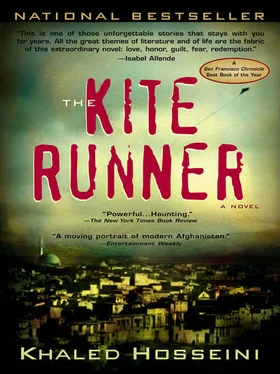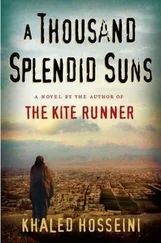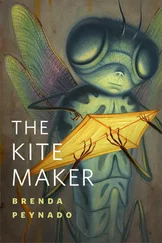And, from Soraya, I learned the details of what had happened in Virginia.
We were at a wedding. Soraya’s uncle, Sharif, the one who worked for the INS, was marrying his son to an Afghan girl from Newark. The wedding was at the same hall where, six months prior, Soraya and I had had our awroussi . We were standing in a crowd of guests, watching the bride accept rings from the groom’s family, when we overheard two middle-aged women talking, their backs to us.
“What a lovely bride,” one of them said, “Just look at her. So maghbool , like the moon.”
“Yes,” the other said. “And pure too. Virtuous. No boyfriends.”
“I know. I tell you that boy did well not to marry his cousin.”
Soraya broke down on the way home. I pulled the Ford off to the curb, parked under a streetlight on Fremont Boulevard.
“It’s all right,” I said, pushing back her hair. “Who cares?”
“It’s so fucking unfair,” she barked.
“Just forget it.”
“Their sons go out to nightclubs looking for meat and get their girlfriends pregnant, they have kids out of wedlock and no one says a goddamn thing. Oh, they’re just men having fun! I make one mistake and suddenly everyone is talking nang and namoos , and I have to have my face rubbed in it for the rest of my life.”
I wiped a tear from her jawline, just above her birthmark, with the pad of my thumb.
“I didn’t tell you,” Soraya said, dabbing at her eyes, “but my father showed up with a gun that night. He told… him… that he had two bullets in the chamber, one for him and one for himself if I didn’t come home. I was screaming, calling my father all kinds of names, saying he couldn’t keep me locked up forever, that I wished he were dead.” Fresh tears squeezed out between her lids. “I actually said that to him, that I wished he were dead.
“When he brought me home, my mother threw her arms around me and she was crying too. She was saying things but I couldn’t understand any of it because she was slurring her words so badly. So my father took me up to my bedroom and sat me in front of the dresser mirror. He handed me a pair of scissors and calmly told me to cut off all my hair. He watched while I did it.
“I didn’t step out of the house for weeks. And when I did, I heard whispers or imagined them everywhere I went. That was four years ago and three thousand miles away and I’m still hearing them.”
“Fuck ’em,” I said.
She made a sound that was half sob, half laugh. “When I told you about this on the phone the night of khastegari , I was sure you’d change your mind.”
“No chance of that, Soraya.”
She smiled and took my hand. “I’m so lucky to have found you. You’re so different from every Afghan guy I’ve met.”
“Let’s never talk about this again, okay?”
“Okay.”
I kissed her cheek and pulled away from the curb. As I drove, I wondered why I was different. Maybe it was because I had been raised by men; I hadn’t grown up around women and had never been exposed firsthand to the double standard with which Afghan society sometimes treated them. Maybe it was because Baba had been such an unusual Afghan father, a liberal who had lived by his own rules, a maverick who had disregarded or embraced societal customs as he had seen fit.
But I think a big part of the reason I didn’t care about Soraya’s past was that I had one of my own. I knew all about regret.
SHORTLY AFTER BABA’S DEATH, Soraya and I moved into a one-bedroom apartment in Fremont, just a few blocks away from the general and Khala Jamila’s house. Soraya’s parents bought us a brown leather couch and a set of Mikasa dishes as housewarming presents. The general gave me an additional present, a brand-new IBM typewriter. In the box, he had slipped a note written in Farsi:
Amir jan,
I hope you discover many tales on these keys.
General Iqbal Taheri
I sold Baba’s VW bus and, to this day, I have not gone back to the flea market. I would drive to his gravesite every Friday, and, sometimes, I’d find a fresh bouquet of freesias by the headstone and know Soraya had been there too.
Soraya and I settled into the routines – and minor wonders – of married life. We shared toothbrushes and socks, passed each other the morning paper. She slept on the right side of the bed, I preferred the left. She liked fluffy pillows, I liked the hard ones. She ate her cereal dry, like a snack, and chased it with milk.
I got my acceptance at San Jose State that summer and declared an English major. I took on a security job, swing shift at a furniture warehouse in Sunnyvale. The job was dreadfully boring, but its saving grace was a considerable one: When everyone left at 6 P.M. and shadows began to crawl between aisles of plastic-covered sofas piled to the ceiling, I took out my books and studied. It was in the Pine-Sol-scented office of that furniture warehouse that I began my first novel.
Soraya joined me at San Jose State the following year and enrolled, to her father’s chagrin, in the teaching track.
“I don’t know why you’re wasting your talents like this,” the general said one night over dinner. “Did you know, Amir jan, that she earned nothing but A’s in high school?” He turned to her. “An intelligent girl like you could become a lawyer, a political scientist. And, Inshallah , when Afghanistan is free, you could help write the new constitution. There would be a need for young talented Afghans like you. They might even offer you a ministry position, given your family name.”
I could see Soraya holding back, her face tightening. “I’m not a girl, Padar. I’m a married woman. Besides, they’d need teachers too.”
“Anyone can teach.”
“Is there any more rice, Madar ?” Soraya said.
After the general excused himself to meet some friends in Hayward, Khala Jamila tried to console Soraya. “He means well,” she said. “He just wants you to be successful.”
“So he can boast about his attorney daughter to his friends. Another medal for the general,” Soraya said.
“Such nonsense you speak!”
“Successful,” Soraya hissed. “At least I’m not like him, sitting around while other people fight the Shorawi , waiting for when the dust settles so he can move in and reclaim his posh little government position. Teaching may not pay much, but it’s what I want to do! It’s what I love, and it’s a whole lot better than collecting welfare, by the way.”
Khala Jamila bit her tongue. “If he ever hears you saying that, he will never speak to you again.”
“Don’t worry,” Soraya snapped, tossing her napkin on the plate. “I won’t bruise his precious ego.”
IN THE SUMMER of 1988, about six months before the Soviets withdrew from Afghanistan, I finished my first novel, a father-son story set in Kabul, written mostly with the typewriter the general had given me. I sent query letters to a dozen agencies and was stunned one August day when I opened our mailbox and found a request from a New York agency for the completed manuscript. I mailed it the next day. Soraya kissed the carefully wrapped manuscript and Khala Jamila insisted we pass it under the Koran. She told me that she was going to do nazr for me, a vow to have a sheep slaughtered and the meat given to the poor if my book was accepted.
“Please, no nazr , Khala jan,” I said, kissing her face. “Just do zakat , give the money to someone in need, okay? No sheep killing.”
Six weeks later, a man named Martin Greenwalt called from New York and offered to represent me. I only told Soraya about it. “But just because I have an agent doesn’t mean I’ll get published. If Martin sells the novel, then we’ll celebrate.”
Читать дальше












